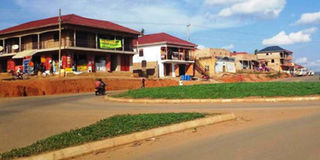Tarmacked road gives Bobi Wine town facelift

Some of the storeyed buildings along the upgraded road which has changed the face of the town. Photo by MOSES MUWULYA
What you need to know:
Once a dusty area with hardly any public transport, Kanoni Town is gradually developing with a more reliable public transport and better roads.
Kanoni Town is approximately 97 kilometers, southwest of Kampala. It is the commercial, administrative, and political headquarters of Gomba District.
This country home of Kyadondo East MP Robert Kyagulanyi, aka Bobi Wine, has for a long time been known as dusty town. Speeding cars driving through the town always left behind a cloud of dust.
Thanks to the upgraded Mpigi Kanoni-Sembabule road, along which the town is located, Kanoni is getting a new face.
Abel Wasswa, the Kanoni LC1 chairperson, who settled in the area in 1986, says the road has since taken a centre stage in beautifying the town.
“Because of the road, our town is no longer despised for being dusty, for having transport challenges where a car leaves you and you cancel the journey because of few taxis,” Waswa recalls.
Infrastructure
The town has a number of storeyed buildings, which have since been occupied by retail and wholesale shops dealing in different goods and among these are hardware shops.
“Transport is getting better every single day, unlike in the past where we only had three commuter taxis operating along the route and once one missed out on any of these, he had to cancel the journey,” Waswa notes.
The former taxi driver still recalls the many hours they spent along the way due the impassable roads: “Imagine spending two to three hours before reaching the highway in an overloaded taxi where passengers were not comfortable”
The town boasts of being among the few small towns with solar-powered security lights on two major streets.
Cosmas Nsenkanabo, a resident, says: “I think apart from Municipalities, Kanoni is among the few towns which are fully lit.
Communication
The town recently got a radio station, (Gomba FM), the first in one Gomba District. Leaders here believe it will ease their communication to the masses.
Cost of land
Because the town is rapidly developing, land according to Fred Kuteesa, the Kanoni Town Council chairperson, is increasing getting expensive.
On average, a 50ft by 100ft plot of land costs between Shs5m and Shs8m, which initially would not cost more than Shs2m and a plot would take a bit of time without attracting buyers.
Before any one buys land, Kuteesa warns that it is prudent to consult local leaders to ensure the land being bought is free from conflict of ownership.
Cost of rent
The cost of housing is also relatively increasing; the rooms in storeyed buildings go for Shs200,000 a month while those along the minor streets go for Shs100, 000 with the cheapest rental going for Shs50,000 a month.
Hotel accommodation
The town is yet to have posh accommodation facilities. It depends on motels and Mubiru Motel is still the common accommodation in the town, with its rooms going for Shs10,000 and food costing between Shs3000 and Shs6000.
Security
Kuteesa, the head of the town council security, says Kanoni is secure and most of the crimes registered are petty. He says cases of theft are rare.
“Even in the recent upcountry free BobiWine demonstrations, where locals in the town demonstrated to have their ‘homeboy’ freed, we managed to calm the situation,” Kutesa says.
He says the demonstrations turned chaotic. One person was shot dead as police tried to disperse protestors in this ancestral home f Bobiwine.
Health and education
Kanoni has one public health centre- Kanoni Health Centre III, one pharmacy and a number of drug shops where financially able natives go for treatment.
Education
The town has a good number of primary schools although majority are privately owned. It also has two secondary schools.
Commercial services
Several shops both retail and wholesale are all over the town. There are also four coffee processing factories and Kanoni Plastic industry.
However, the the plastic industry has suspended operation over high costs of production.
Isma Golooba, the Director Kanoni Plastic Works Company, says besides the high power tariffs, the power supply is very unstable.
Transport
Unlike in the past, where overloading was the norm because there were few commuter taxis and once the last one left you, you had to cancel the journey, today several taxis operate along Kanoni route and at any time one can go to Kampala.
Martin Sekyanzi, a taxi conductor, says a taxi to Kampala is Shs10,000 and because of the upgraded road, the charge is likely to reduce if fuel prices go down.
Challenges
Health care is among the issues disturbing the natives as the only health centre III in the area, can only offer primary health care and makes a lot of referrals for cases, which are not manageable.
Abel Wasswa, the Kanoni LC1 chairperson says many find it difficult to go to Gombe and Mubende hospitals where they are normally referred to for emergency care. Kanoni is 25 kilometers from Kanoni to Gombe hospital and 70km to Mpigi. “We don’t have an ambulance to transport the patients who may need urgent attention, especially expectant mothers,” he says.
Fred Kuteesa, the Kanoni Town Council chairperson however, notes that plans are underway to elevate the facility to level four as they push for realisation of the president’s promise to make it a district hospital.




